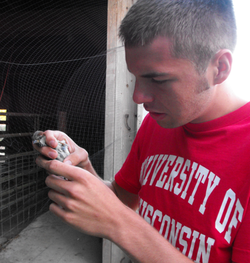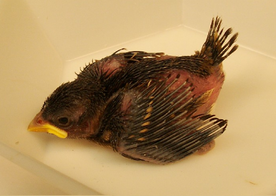Digestion in Passerine Birds

Catching House Sparrows in Madison, WI
In order to grow and reproduce, birds must break down ingested food to obtain nutrients and energy. However, most research on how birds acquire nutrients has been focused on agricultural poultry. Passerine birds, or song birds, are an extremely diverse and successful group that has been understudied.
Many species (such as chickens) alter the activities of their digestive enzymes to correspond to the nutrients that are being ingested. That is, when chickens feed on starch-rich diets, the activity of starch-digesting enzymes in the gut increases. However, previous research shows that passerine birds seem to lack such regulation. Some young birds show changes in activities of digestive enzymes that correspond to changing diet over development, but it was unclear whether these activities were flexible. Therefore, we investigated whether nestlings might have an increased capacity to regulate digestive enzyme activities in response to changes in diet composition.
Many species (such as chickens) alter the activities of their digestive enzymes to correspond to the nutrients that are being ingested. That is, when chickens feed on starch-rich diets, the activity of starch-digesting enzymes in the gut increases. However, previous research shows that passerine birds seem to lack such regulation. Some young birds show changes in activities of digestive enzymes that correspond to changing diet over development, but it was unclear whether these activities were flexible. Therefore, we investigated whether nestlings might have an increased capacity to regulate digestive enzyme activities in response to changes in diet composition.

This work resulted in the following findings:
1. While adult house sparrows are unable to modulate activities of digestive enzymes, nestling house sparrows are able to regulate according to diet. [PDF]
2. This regulation represents reversible phenotypic flexibility, not irreversible developmental plasticity. [PDF]
3. Digestive enzymes of nestlings respond to both starches and lipids as dietary signals [PDF]
4. Pancreatic enzymes seem to be under genetic control, and are not as strongly regulated according to current diet. [PDF]
5. Passerine birds have evolved carbohydrase activities correlated to the amount of dietary starch they normally eat in the wild. [PDF]
1. While adult house sparrows are unable to modulate activities of digestive enzymes, nestling house sparrows are able to regulate according to diet. [PDF]
2. This regulation represents reversible phenotypic flexibility, not irreversible developmental plasticity. [PDF]
3. Digestive enzymes of nestlings respond to both starches and lipids as dietary signals [PDF]
4. Pancreatic enzymes seem to be under genetic control, and are not as strongly regulated according to current diet. [PDF]
5. Passerine birds have evolved carbohydrase activities correlated to the amount of dietary starch they normally eat in the wild. [PDF]
Copyright © 2024 KOHL LAB - University of Pittsburgh
